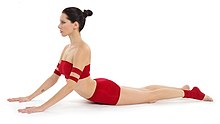Bhujangasana
This article includes a list of references, related reading, or external links, but its sources remain unclear because it lacks inline citations. (October 2018) |

Bhujangasana (Sanskrit pronunciation: [bʱʊ.ɟ͡ʝəŋ.gɑːsə.nə];[1] Sanskrit: भुजङ्गासन; IAST: Bhujaṅgāsana) or Cobra Pose[2] is a back-bending yoga asana[3].
Etymology
The name comes from the Sanskrit words bhujanga meaning "snake" or "serpent" and asana (आसन) meaning "posture" or "seat".
From a prone position with palms and legs on the floor, the chest is lifted.
This asana resembles a serpent with its hood raised. Cobra Pose or Bhujangasana is part of the sequence of yoga postures in Padma Sadhana and Surya Namaskar or Sun Salutation. Bhujangasana is pronounced as BHU-jung-AAHS-uh-nuh.
Bhujang = Snake (Cobra); Asana = Posture or Pose
To get into this position, come onto the ground on your stomach. Place both palms under the shoulders. Draw your elbows towards your side body. Keeping the gaze down towards your mat, maintain a neutral neck. As you inhale, push down through the palms and lift the chest, engaging the core and lifting the quads off the ground. Tops of the feet should still press into the ground. The neck remains neutral and the gaze stays on the ground.[citation needed]
Benefits
Bhujangasana may strengthen the spine, stretch the chest, shoulders, and abdomen, firm the buttocks, remove lethargy relieve stress and fatigue and makes practitioner active. Traditional texts say that Bhujangasana increases body heat, destroys disease, and awakens kundalini. The practitioner gets benefited by the qualities that a cobra have i.e. a good digestion, supple body, activeness, and longevity.
Cautions
Common postural errors during this asana include overarching the neck and lower back. One recommendation is to keep the gaze directed down at the floor and focus on bringing movement into the area between the shoulder blades (the thoracic area, or middle back).[4]
Follow-up asanas
Bhujangasana is followed by Salabhasana. In Surya Namaskar, it precedes Adho Mukha Svanasana.
See also
References
- ^ Budilovsky, Joan; Adamson, Eve (2000). The complete idiot's guide to yoga (2 ed.). Penguin. p. 156. ISBN 978-0-02-863970-3. Retrieved 11 April 2011.
- ^ "Yoga Journal – Cobra Pose". Retrieved 2011-04-09.
- ^ How To Do Cobra Pose https://www.verywell.com/cobra-pose-bhujangasana-3567067
- ^ Yoga for Chronic Pain, Part I, By Timothy McCall, M.D.
- Lasater, Judith Hanson (July–August 2005). "Instant yoga: Cobra Pose (Bhujangasana)". Natural Health. 35 (7): 24.
- Wilson, RL (February 1976). "An introduction to Yoga". American Journal of Nursing. 76 (2): 261–3. doi:10.2307/3423818. JSTOR 3423818. PMID 1044224.
Further reading
- Iyengar, B. K. S. (1 October 2005). Illustrated Light On Yoga. HarperCollins. ISBN 978-81-7223-606-9. Retrieved 9 April 2011.
- Saraswati, Swami Satyananda (1 August 2003). Asana Pranayama Mudra Bandha. Nesma Books India. ISBN 978-81-86336-14-4. Retrieved 9 April 2011.
- Saraswati, Swami Satyananda (January 2004). A Systematic Course in the Ancient Tantric Techniques of Yoga and Kriya. Nesma Books India. ISBN 978-81-85787-08-4. Retrieved 9 April 2011.
External links
- Cobra Pose Video and Step by Step Instruction]
- Pizer, Ann. "Cobra Pose – Bhujangasana". Yoga. About.com. Archived from the original on 3 March 2007. Retrieved 14 February 2007.
{{cite web}}: Unknown parameter|deadurl=ignored (|url-status=suggested) (help) - 10 Yoga Poses Variation | Cobra Poses | Bhujangasana
- Bhujangasana-the cobra pose-the backward bending asana | Cobra Poses | Bhujangasana

